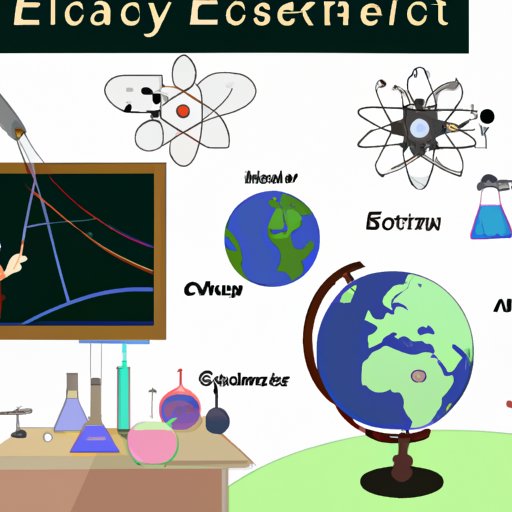Introduction
Physical science is a broad field of study that encompasses many branches of natural science. It is the scientific study of matter and energy, and how they interact with each other. Physical science covers topics such as physics, chemistry, astronomy, and earth science. It is an interdisciplinary field that seeks to understand the properties and behavior of matter, energy, and the universe.
Branches of Physical Science
The four main branches of physical science are physics, chemistry, astronomy, and earth science.
Physics
Physics is the study of matter and energy, and how they interact with each other. It is concerned with the fundamental laws of nature, such as motion, force, energy, and gravity. It is also concerned with the structure of matter, and how it behaves under different conditions. Examples of topics studied in physics include thermodynamics, classical mechanics, electromagnetism, quantum mechanics, relativity, and nuclear physics.
Chemistry
Chemistry is the study of the composition, structure, and properties of matter. It is concerned with the transformation of matter through chemical reactions, and the use of these transformations to create new materials. Examples of topics studied in chemistry include organic chemistry, biochemistry, physical chemistry, analytical chemistry, and inorganic chemistry.
Astronomy
Astronomy is the study of the universe beyond Earth. It is concerned with the formation and evolution of stars, galaxies, and planets, as well as the origin and fate of the universe. Examples of topics studied in astronomy include stellar evolution, cosmology, and planetary science.
Earth Science
Earth science is the study of the Earth, its atmosphere, and its environment. It is concerned with the physical, chemical, and biological processes that shape and affect our planet. Examples of topics studied in earth science include geology, oceanography, meteorology, hydrology, and climatology.
Applications of Physical Science
Physical science has a wide range of applications in medicine, engineering, technology, and environmental science.
Medicine
Physical science plays an important role in the field of medicine. Its principles are used to diagnose and treat disease, as well as to develop new drugs and medical devices. Through the use of physics, chemistry, and biology, scientists are able to better understand the human body and its functions.
Engineering
Physical science is essential for the design and construction of many engineering projects. Its principles are used to analyze the feasibility of projects, as well as to develop new technologies and processes. Through the use of physics, chemistry, and mathematics, engineers are able to solve complex problems and create innovative solutions.
Technology
Physical science is essential for the development of new technologies. Its principles are used to understand and control the physical world, as well as to create new tools and machines. Through the use of physics, chemistry, and engineering, scientists are able to create new products and services that improve our lives.
Environmental Science
Physical science is essential for the protection of the environment. Its principles are used to understand and monitor the effects of human activities on the environment. Through the use of physics, chemistry, and biology, scientists are able to identify potential threats and develop strategies to mitigate them.
Role of Physical Science in Society
Physical science plays an important role in society. It is used for research and development, education, and problem solving.
Research and Development
Physical science is essential for research and development. Its principles are used to discover new knowledge and develop new technologies. Through the use of physics, chemistry, and mathematics, scientists are able to explore the unknown and uncover new possibilities.
Education
Physical science is essential for education. Its principles are used to teach students about the physical world, as well as to inspire their creativity and critical thinking. Through the use of physics, chemistry, and biology, teachers are able to engage students and help them understand the world around them.
Problem Solving
Physical science is essential for problem solving. Its principles are used to analyze data, as well as to develop new solutions. Through the use of physics, chemistry, and mathematics, scientists are able to develop strategies to address complex problems.
History of Physical Science
Physical science has a long and rich history. It began in ancient Greece, continued through the Middle Ages and Enlightenment period, and culminated in the modern era.
Ancient Greece
The earliest known physical sciences were practiced in Ancient Greece. Greek philosophers such as Thales, Anaximander, and Democritus developed theories about the nature of matter and the universe. These early theories laid the foundation for modern physical science.
Middle Ages
During the Middle Ages, physical science was largely neglected. However, there were some advances in the fields of optics, astronomy, and mechanics. These advances laid the groundwork for the scientific revolution of the 16th century.
Enlightenment Period
The scientific revolution of the 17th and 18th centuries ushered in the Enlightenment period. This period saw great advances in the fields of physics, chemistry, and astronomy. Scientists such as Isaac Newton, Robert Boyle, and Antoine Lavoisier made discoveries that laid the foundation for modern physical science.
Modern Era
In the 19th and 20th centuries, physical science underwent rapid expansion. New branches of physical science were developed, such as geology, oceanography, and meteorology. Advances in these fields led to increased understanding of the physical world and its processes.
Conclusion
Physical science is a broad field of study that encompasses many branches of natural science. It is the scientific study of matter and energy, and how they interact with each other. Physical science has a wide range of applications in medicine, engineering, technology, and environmental science. It also plays an important role in society, providing research and development, education, and problem solving. Physical science has a long and rich history, beginning in ancient Greece and culminating in the modern era.
(Note: Is this article not meeting your expectations? Do you have knowledge or insights to share? Unlock new opportunities and expand your reach by joining our authors team. Click Registration to join us and share your expertise with our readers.)
